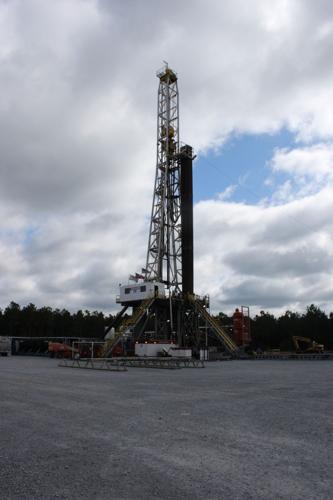An $80 million Australis Oil & Gas Co. deal for Encana Corp.'s remaining acreage in the Tuscaloosa Marine Shale is an encouraging sign, but oil prices will continue to limit the amount of new drilling, industry experts say.
"The idea that there's a fresh company moving in is very interesting and appealing. They wouldn't have bought it if they didn't have fresh ideas, new ideas for making the play a success," said Charlotte Batson, owner of Batson & Co. and a self-described longtime cheerleader for the shale. "I don't think it's a guarantee of any kind, and certainly their investor presentation made it pretty clear that there are no plans to descend on it with 50 rigs working this summer."
The Tuscaloosa Marine Shale is an oil-rich formation that spans Louisiana's midsection and stretches into Mississippi. The formation is still in the developmental stage. The most productive wells have been drilled in an oblong-shaped core area that includes parts of three counties in southwest Mississippi and St. Helena, Tangipahoa and Washington parishes. But well costs were among the most expensive in the country and drilling activity in the nascent formation evaporated when oil prices plunged two years ago.
Australis is based in Australia and headed by Jonathan Stewart, the founder of Aurora Oil & Gas, one of the early developers of the Eagle Ford Shale in Texas. Australis already owned a 50 percent interest in 38,000 acres leased in the Tuscaloosa before the Encana deal. The acquisition gives the Australian company more than 122,000 acres within the Tuscaloosa Marine Shale core, making it the biggest player in the formation.
Australis' initial focus will be maintaining and extending leases within the 40,000 undeveloped acres, Stewart said in announcing the deal. The next phase of development likely will be drilling a small number of wells in 2018.
David Dismukes, executive director of the LSU Center for Energy Studies, said the acquisition is probably just a buy option.
"It seems like an affordable option for them. If prices turn, this, that and the other, they got a good deal on the option," Dismukes said. "If not, they move on to something else."
Although service-related costs plunged about 60 percent during the oil industry's slump, the issue for drillers in the Tuscaloosa remains one of economics, Dismukes said. Lower costs help the Tuscaloosa, but it's still far less expensive, and more profitable, to drill in the Permian Basin in Texas.
Australis says wells in the Tuscaloosa core can be profitable with current oil and well prices. There hasn't been any drilling in the formation since 2015, but at that time, a well cost about $10 million to $11 million. Those costs could be lowered, thanks to gains in efficiency and batch drilling, or drilling multiple wells per pad, and economies of scale.
Black gold has turned to red ink for major players in the once promising Tuscaloosa Marine Shale.
However, others have questioned Australis' projections, including one of the former major players in the Tuscaloosa. In a March 2 conference call with stock analysts and investors, Goodrich Petroleum CEO Walter Goodrich said Australis picked up the acreage for little, roughly the cost of reserves that are now being produced.
"But the reality is that in our view that play … starts to work in terms of new development at $65 to $70 a barrel," Goodrich said.
Goodrich Petroleum Corp. reported a net loss of $25.2 million, or 44 cents per share, compar…
Either way, the economics of the Permian remain much stronger. Industry members say it's possible to make money on Permian wells when oil is less than $40 a barrel. Drillers are flocking to West Texas and New Mexico because of that. Last week, oil was hovering in the $47 range.
In January, Exxon Mobil Corp. traded $5.6 billion in stock for leases on 275,000 acres in the Permian. Earlier this month, Marathon Oil Corp. paid $1.1 billion for leases on 70,000 acres.
"You've gone down but so has everyone else. ... That's the problem," Dismukes said.
In addition, drillers in the Tuscaloosa don't have much negotiating power with service companies, he said. Less than three dozen wells have been drilled in the formation, so there is little chance at current prices to create a drilling program large enough to generate any additional discounts.
Meanwhile, the big discounts service companies granted during the slump aren't going to last much longer.
"There are a lot of stories that are perking up in the other basins, with service companies going back to the operators and producers and saying, 'Hey, we were here with you during the pain. We felt the pain with you. Prices are going back up, and you're moving, and we want to share in some of the benefits, too,' ” Dismukes said.
Still, Batson said she's excited that Australis executives, while at Aurora, were among the early players in the Eagle Ford, which has some similar geology to the Tuscaloosa.
Australis has a lot of experience in taking a formation from the early stages through the entire development process, Batson said.
"They think that the (Tuscaloosa) potential is tremendous … and it's clear they have some good ideas on how to approach that," Batson said. "Now we'll just have to give them time to plan their operations, do their analysis and their background work, and everything they need before they launch their operations in the field."




